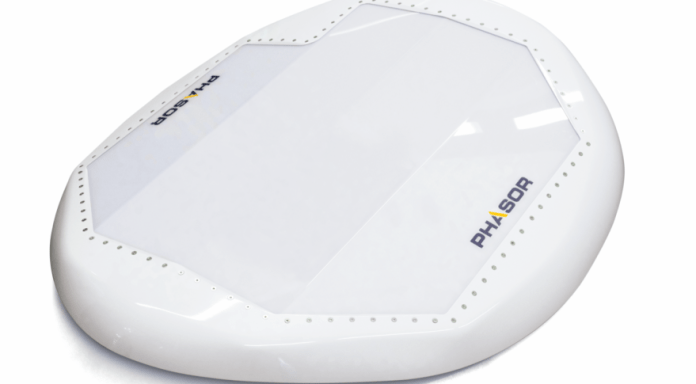Phasor experienced problems in 2018 that prevented merchandise release and pushed a redesign with the microchips in its own apartment antenna. Credit: Phasor.
WASHINGTON — Hanwha Systems, a South Korean defense firm, bought Phasor Solutions, a firm that ran from money seeking to develop a phased array antenna for satellite communications.
Hanwha Systems announced June 8 that it closed a deal to acquire Phasor Solutions’ business and assets. The purchase was finalized June 5.
London-based Phasor Solutions had entered government, the U.K. equivalent of insolvency, on April 7 after previous discussions for acquisition by a multinational business fell through.
Phasor Solutions’ parent firm Phasor Inc. of Arlington, Virginia, had been trying since 2018 to increase $25 million in equity to encourage Phasor Solutions’ antenna development, but fought to acquire over $9 million in obligations.
Phasor Solutions had made 650,000 of that $1.1 million before the deal collapsed, leaving the antenna firm without a means of regaining the loan.
Phasor Solutions attributed the coronavirus pandemic. Hanwha Systems explained it”knowingly contacted Phasor Solutions for the purchase bargain” subsequent news of the antenna manufacturer’s insolvency.
Hanwha Systems is an defense aerospace and also information-technology specialist that’s entered the satellite antenna industry by its order of Phasor Solutions and its own resources.
Phasor shaped in 2005, and at one point anticipated commercially releasing its initial antennas at 2018, but ran to operation issues with the antenna’s center microchips, resulting in redesign function that stretched from 2018 into ancient 2020, according to a June 2 government record. On April 20, Phasor Solutions laid off all but nine of its 30 workers under the direction of Duff & Phelps, its own administrator.
Phasor had worked in-flight connectivity supplier Gogo, with satellite operator Intelsat, and also internet-of-things startup on bolstering its antennas for various connectivity programs Kepler Communications. Hanwha Systems said demand for connectivity such as Amazon Kuiper system and SpaceX’s Starlink will drive demand for satellite antennas.
Electronically steered antennas, such as the ones Phasor is developing, can track more or two satellites simultaneously, a characteristic considered essential to LEO satellite internet’s success. The expense of producing such antennas has prevented their widespread adoption.
– Advertisement –
